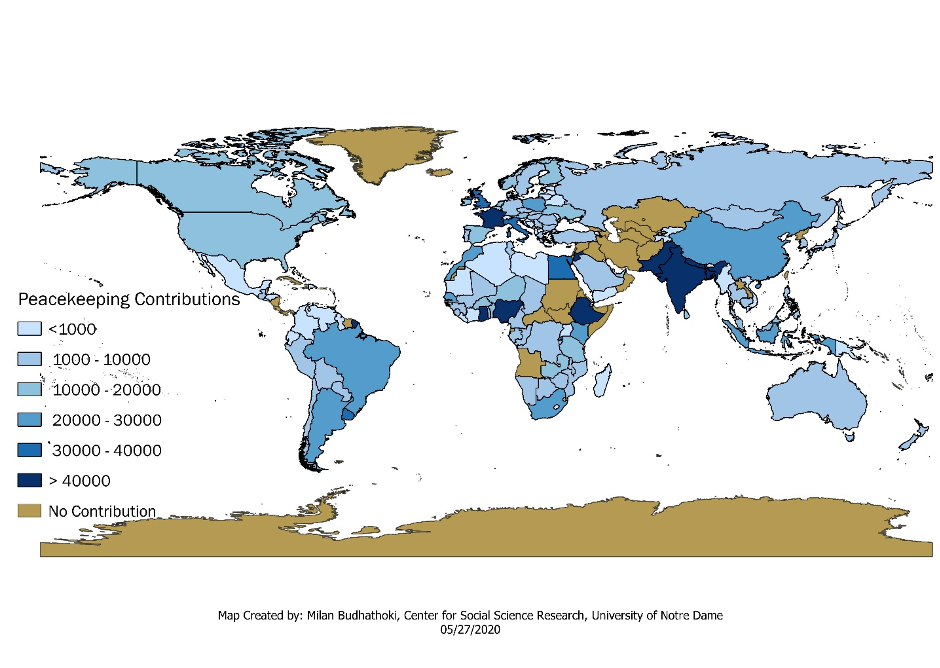Editors’ note: May 29 is the International Day of United Nations Peacekeepers.
Within two weeks of the World Health Organization’s assessment of rapidly spreading coronavirus outbreaks as a pandemic, the United Nations Secretary-General António Guterres called for a global ceasefire—a comprehensive truce in the world’s deadly conflicts. Designed to allow humanitarian workers to reach the most vulnerable populations affected by the coronavirus pandemic, the truce, Mr. Guterres said, should “end the sickness of war.”
The spread of coronavirus, however, has not deterred organized armed actors around the world. According to the Armed Conflict Location and Event Data project report, armed actors took steps towards ceasefires only in 10 out of 43 countries currently fighting organized armed conflicts. Since the call for a global ceasefire, conflict incidents in many of these countries have increased. Civilians in war zones from Myanmar to Mali are forced to live in fear of both visible armed actors and the invisible coronavirus.
Every year, thousands of unarmed civilians are killed in armed conflicts. Millions are displaced and forced to seek refuge in other countries. The United Nations deploys peacekeeping missions in order to minimize the suffering of civilians in war zones, and to protect ceasefires and political settlements. Peacekeepers play an important role in making the hard-hit conflict zones accessible to aid workers and volunteers delivering food and medical supplies. As of April 2020, there were 13 active peacekeeping missions with more than 82,000 peacekeepers assembled from 117 different countries. All these countries have now reported COVID-19 cases. Lately, both the peacekeeper-receiving and peacekeeper-contributing countries have reported an increasing number of COVID-19 cases.
Why the pandemic matters for peacekeeping
Peacekeeping in conflict zones is dangerous, and the coronavirus pandemic has made it even more dangerous. COVID-19 has already affected UN peacekeeping missions. The activities of peacekeepers are now being confined to critical functions in order to limit the impact and spread of the coronavirus. In many cases, peacekeepers and observers are not able to access the conflict zone. As a result, women, children, the poor, and the displaced people who are affected by fighting in these zones are not able to receive humanitarian support. If guns are not silenced and civilian targeting does not decrease, demand for peacekeeping will increase in coming months and years. Unfortunately, the pandemic will limit the willingness and resolve of countries to contribute additional peacekeepers or support them financially.

Providing peacekeepers
While peacekeeping countries are often touted by the international community and rewarded in the form of foreign aid, the pandemic has affected domestic and international politics. Many countries are now focused on protecting their own domestic population. Accordingly, peacekeeper-contributing countries are mobilizing troops on the domestic frontlines. They are enforcing lockdowns, patrolling streets, and running hospitals in order to contain the spread of the coronavirus. Many countries will find it difficult, therefore, to continue to commit international peacekeeping forces on a pre-pandemic scale.
Another limiting factor is the fragility of health systems in so many of the countries receiving (and sending) peacekeepers. Peacekeepers in war zones work closely with communities facing dire living conditions and lacking adequate healthcare infrastructure. From the perspective of the sending nations, the concern is that their peacekeepers will contract the virus and return home to spread it inadvertently. By the same token, the possibility of peacekeepers exposing the population of the receiving country cannot be ruled out. All of these factors could limit the willingness of countries to deploy peacekeepers at pre-pandemic levels.
Resource constraints and peacekeeping
Resource constraints will further limit peacekeeping during the pandemic. As of January 2019, according to UN News, the “United Nations faces a $2 billion shortfall in UN Peacekeeping funding.” While no additional severe funding issues have emerged so far since the declaration of the pandemic, UN peacekeeping is likely to face further financial difficulties. The economies of resource-abundant countries are reeling, placing in doubt their capacity or willingness to continue funding peacekeeping efforts. Indeed, preparing and deploying peacekeepers amid this pandemic requires even greater financial resources, in part to purchase personal protective equipment. Unfortunately, PPE is limited in supply all over the world.
Separation from families
Thousands of miles always from home, individual peacekeepers undoubtedly worry about their families. Separation from families for a prolonged period is not good for the psychological wellbeing of peacekeepers and their family members. Making matters more stressful, the UN Peacekeeping Department has asked peacekeeping teams to delay rotations for three months in order to maintain their missions’ operational strength. In light of the fact that the coronavirus pandemic has spread rapidly in Africa, where most of the missions are deployed, and in South Asia, where a majority of peacekeepers are from, further delays are expected in peacekeeper rotations.
It is our shared moral and political responsibility to devise creative and effective solutions to this crisis in peacekeeping.
Notwithstanding these mounting challenges to its viability, UN peacekeeping missions remain essential to the overall health and security of the human population. In war-torn countries, peacekeepers have contributed to durable peace, created space for democratic practices, and saved civilians who otherwise would be the target of one-sided violence. During the pandemic, peacekeepers are on the frontlines with resolve and commitment to alleviate the human suffering caused by unnecessary wars.
Multilateral agencies and contributing nations make peacekeeping possible in “ordinary” times; their agency is even more critical in these extraordinary times. “The United Nations” is the apt term for all of us and our governments striving to fulfill peacekeeping mandates. It is our shared moral and political responsibility to devise creative and effective solutions to this crisis in peacekeeping, lest the distress of millions of civilians suffering the visible terrors of war and the invisible terrors of the pandemic increase and spread like the plague itself.
Madhav Joshi is research associate professor and associate director of the Peace Accords Matrix at the Kroc Institute for International Peace Studies, part of the Keough School of Global Affairs.
This article is part of a series of blog posts published by the Keough School of Global Affairs. Dignity and Development provides in-depth analysis of global challenges through the lens of integral human development.



